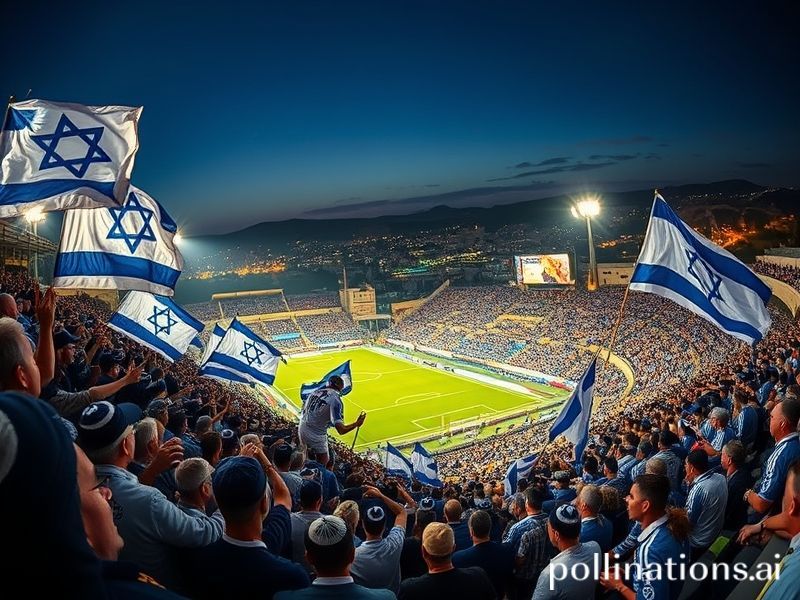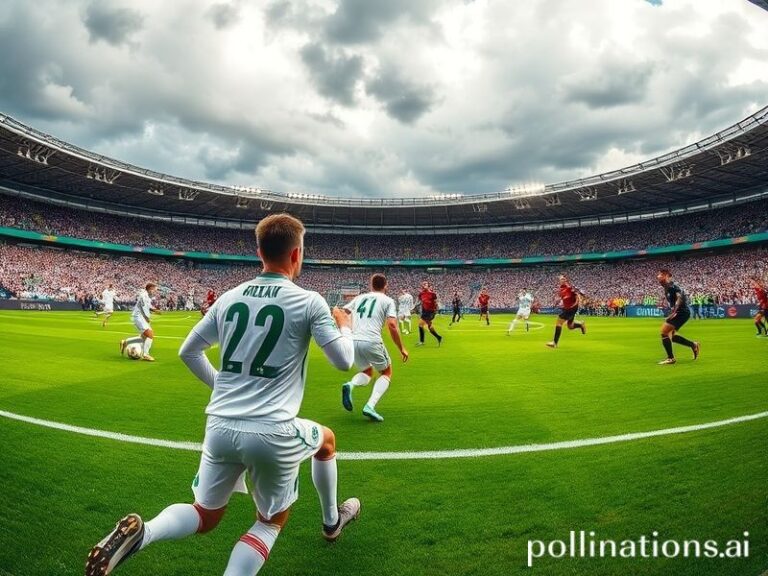Chosen League: How Israeli Football Became the World’s Favorite Geopolitical Rorschach Test
Tel-Aviv—Wednesday, 11:47 p.m. local time, which is 3:47 p.m. in New York, 8:47 p.m. in London, and always exactly “now” on Twitter. The floodlights of Bloomfield Stadium are bathing the Mediterranean in that particular shade of LED orange that makes every player look like an overcooked prawn. The crowd—equal parts hummus-scented hipsters, chain-smoking grandmothers, and American Birthright alumni who think chanting “Yalla!” counts as assimilation—has just watched Maccabi Tel-Aviv concede a last-minute equalizer to a team whose budget is smaller than the stadium’s monthly electricity bill. Somewhere in the commentary booth, a British pundit is earnestly explaining “Israeli football’s existential crisis,” blissfully unaware that existential crises are the only thing in the Middle East with unlimited stoppage time.
Welcome to Israeli football: a league where biblical grudges meet VAR, and where the most reliable offside trap is politics.
On paper, the Israeli Premier League is the 14-team sideshow of a sideshow—ranked 21st in Europe, wedged cosily between Cyprus and Sweden in the UEFA coefficient table, a statistical shrug. Yet the world keeps rubber-necking. Why? Because nothing globalizes quite like unresolved trauma wrapped in polyester kits. The league’s clubs—Hapoel “raised-by-socialists” Tel-Aviv, Beitar “our-fans-still-won’t-sign-Muslims” Jerusalem, Maccabi “we’re-basically-Barcelona-if-Barcelona-were-broke” Haifa—function as living dioramas of the country’s neuroses. Outsiders tune in less for the step-overs than for the geopolitical Rorschach test.
Take Beitar Jerusalem, whose hardcore La Familia ultras once greeted an incoming Muslim striker with a banner reading “Beitar Forever Pure.” FIFA’s disciplinary committee sent a sternly worded fax; the ultras upgraded their Wi-Fi and doubled the bile. Last season, the club’s owner—an oligarch who made his fortune in something ambiguously mineral—tried rebranding with a glitzy UAE partnership after the Abraham Accords. The result: a single preseason friendly in Dubai, a handful of LinkedIn posts, and zero change in terrace chanting. Somewhere in Brussels, a bureaucrat added another slide to his PowerPoint on “soft power projection.”
Meanwhile, the national team—nicknamed “the Chosen Eleven” by people who think they’re the first to make that joke—continues to perform the miracle of loaves and fishes every qualifying cycle: turning a squad worth approximately one Harry Maguire into a competitive nuisance. Their secret sauce? A diaspora mining operation that would make any Silicon Valley HR director blush. If your grandmother once ate falafel on Dizengoff Street, congratulations, FIFA’s clearing house is now speed-dialling your left-back.
The international implications? Diplomatic box-ticking disguised as sportswashing, but with more sunscreen. When Israel hosted the Under-20 World Cup last summer, European delegations discovered that Tel-Aviv beach volleyball doubles as informal coalition building. A German attaché and a Qatari fixer shared a joint—strictly medicinal, naturally—and by the 80th minute had sketched half a gas deal on a cocktail napkin. Somewhere, Henry Kissinger felt a twinge of professional jealousy.
And then there’s the diaspora’s favorite parlor game: measuring Israeli clubs’ European nights against the broader trauma index. Every Europa League group-stage draw is parsed like Talmud. “We got Villarreal—Spanish, but left-leaning, could go either way.” When Maccabi Haifa briefly threatened to escape the group last autumn, Haaretz ran a 3,000-word think piece linking the offside trap to the Iron Dome. The headline was “Defense Wins Championships—And Sometimes Wars.” Subtlety died; engagement soared.
In the end, Israeli football is what happens when you give an ancient argument a Nike sponsorship. It will never win the Champions League, but it reliably reaches the quarterfinals of global attention. Because nothing says “modern diplomacy” like a penalty shootout that doubles as a referendum on 75 years of nation-building. And somewhere in the stands, an 11-year-old wonders why the away fans are booing the referee instead of the Balfour Declaration. Give it time, kid. Extra time.







